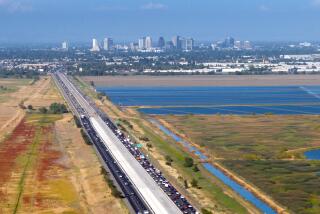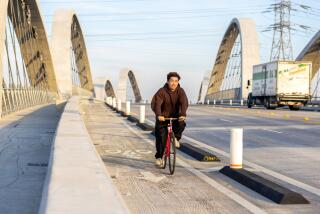The Cure Is Mass Transit
Re “Agile Minds in Idle Cars,” Nov. 23: It should be obvious to everyone by now that California freeway construction will never be able to keep pace with the increase in the automobile population. I have driven over much of Europe, where $5-a-gallon fuel is the norm. With the average European car much smaller than U.S. cars, congestion and parking in cities are as bad or worse than what we experience. Their mass transportation systems are much better than ours but, politically, mass transit has given way to the automobile.
A feasible solution is an extensive surface and sub-surface mass transportation system. A common mistake is requiring mass transportation to pay for itself, and drivers are not enticed or forced out of their cars. Mass transportation should be provided at bargain fares. The economic return will come from less downtime in traffic, no parking fees, reduced freeway building, reduced smog and reduced commuter insurance costs.
Sal Penza
Camarillo
*
Re “Residents Assail Plans to Expand 101 Freeway,” Nov. 23: When a freeway is expanded, rather than increasing traffic speed, the added lanes encourage additional use and the increased capacity is absorbed by the higher demand. Proof of this is seen in the fact that there has been constant freeway construction in Southern California, but average freeway speeds continue to drop.
There is an alternative, and we look to the Pasadena Gold Line light rail system as an example of a cost-effective, environmentally sound project. Pasadena formed a new agency for the specific purpose of installing a light rail line from Union Station to Pasadena. The line is being constructed on time and within budget and will be open in July. The 101 Freeway corridor already has the Red Line from Union Station to Chandler Boulevard, and if this line is continued to Warner Center, there will be no need for an expansion of the 101.
At peak rush-hour use, the Red Line can move more than four times the passenger volume of a five-lane freeway and nine times the volume of a dedicated busway. The Cahuenga Pass is a geologically active area, and as we have witnessed in too many Southern California earthquakes, elevated freeway structures fail with catastrophic results. Conversely, subways around the world have been unaffected by seismic events.
It is time to make a commitment to rail.
Jon Hartmann
Los Angeles
More to Read
Sign up for Essential California
The most important California stories and recommendations in your inbox every morning.
You may occasionally receive promotional content from the Los Angeles Times.









